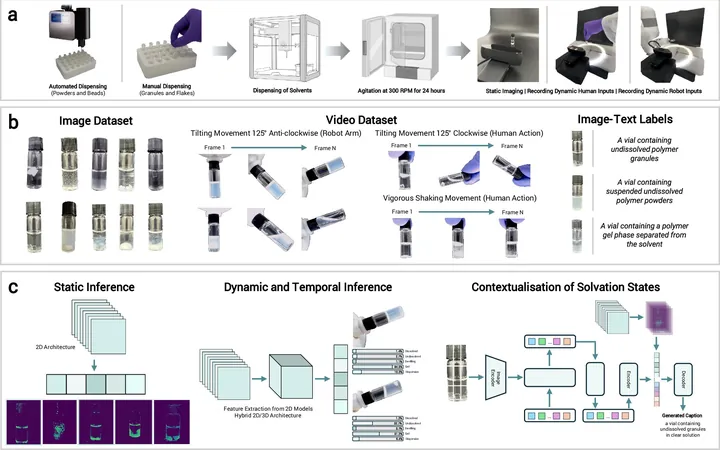
Revolutionizing Materials Discovery: AI Decodes Polymer-Solvent Interactions
2025-07-10
Author: John Tan
A Breakthrough in Polymer Science
In a groundbreaking study published in **npj Computational Materials**, researchers have unveiled an innovative AI system capable of decoding complex interactions between polymers and solvents. This cutting-edge technology utilizes advanced computer vision and language processing to analyze behavior such as swelling, gelation, and dispersion, all derived from images and videos.
Tackling the Complexity of Polymer-Solvent Systems
Polymer-solvent systems are notoriously difficult to study due to their unpredictable nature and the subjective biases often found in human evaluations. Enter this new AI solution, which harnesses multiple models—including convolutional neural networks—to interpret both static and dynamic visual data. The inclusion of a vision-language module allows it to generate descriptive captions, offering a consistent, objective framework for understanding solvation phenomena.
Speeding Up Materials Discovery
According to researcher **Zheng Jie Liew**, this AI assistant significantly enhances data analysis speeds and reliability, especially useful in high-throughput experiments. "Polymers and solvents don’t always behave predictably, and human evaluations can vary greatly. Our AI can observe detailed interactions and articulate them clearly, streamlining the analysis process," Liew explained.
A Collaborative Academic Endeavor
The visionary project is part of Liew’s Ph.D. research, backed by **Ziad Elkhaiary**, who made significant contributions while pursuing his Master’s in Advanced Chemical Engineering at the University of Cambridge. Under the mentorship of **Professor Alexei A. Lapkin**, both have pushed the boundaries of sustainable chemical engineering through their research-led teaching ethos.
Empowering Future Scientists
Professor Lapkin expressed enthusiasm over the real-world impact of this work, stating, "It’s rewarding to see our students shaping cutting-edge science. Participating in such groundbreaking projects equips them to tackle the challenges of sustainable chemical engineering."
Conclusion: AI's Role in Future Materials Innovation
With this new AI system, the future of materials discovery looks brighter than ever, as it promises to remove traditional bottlenecks and pave the way for faster, more efficient research outcomes in the field of polymers and solvents.





 Brasil (PT)
Brasil (PT)
 Canada (EN)
Canada (EN)
 Chile (ES)
Chile (ES)
 Česko (CS)
Česko (CS)
 대한민국 (KO)
대한민국 (KO)
 España (ES)
España (ES)
 France (FR)
France (FR)
 Hong Kong (EN)
Hong Kong (EN)
 Italia (IT)
Italia (IT)
 日本 (JA)
日本 (JA)
 Magyarország (HU)
Magyarország (HU)
 Norge (NO)
Norge (NO)
 Polska (PL)
Polska (PL)
 Schweiz (DE)
Schweiz (DE)
 Singapore (EN)
Singapore (EN)
 Sverige (SV)
Sverige (SV)
 Suomi (FI)
Suomi (FI)
 Türkiye (TR)
Türkiye (TR)
 الإمارات العربية المتحدة (AR)
الإمارات العربية المتحدة (AR)